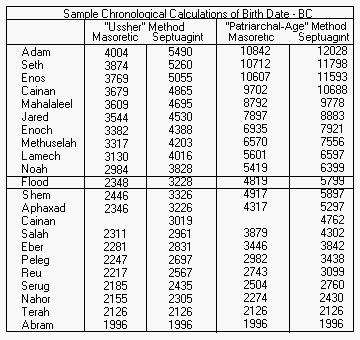Why it is NOT proper to "add up" the genealogies
of Genesis chapter 5 and chapter 11 !
1) "Every word of God is pure; He is a shield unto them that put their trust in him.
Add thou not unto His words, lest He reprove thee, and thou be found a liar." Proverbs 30:5-6a) NO where does the Bible "add up" the genealogies !
b) Or say to "add up" the genealogies !
c) Nor hint at how they should be "added up"!
d) Those that do so must assume that they know how the ancients did genealogies ! But, in fact they often used different rules than just a strict biological father to son lineage. See 2) below and the figure that follows.
2) The difficulties with assuming one knows how to "add up" the genealogies
a) Luke adds a name: In Luke 3:35-36 he includes a Cainan between Salah and Arphaxad. Genesis 11:12-13 includes No name between Arphaxad and Salah. Cainan is the son of Arphaxad and Shelah is the son of Cainan according to Luke; while in the Chronicle this name is not found. However, in Hebrew traditional lineage this name can be found, it is found in the Greek Septuagint Version. Why was this name not in our Bible and found in Septuagint and tradition? By some Hebrew traditions if a person died when they are very young before they have a chance to establish a name for himself, the child born to them will be known as the child of the living grandfather. This practice is shown in the book of Ruth where Ruth’s son Obed is referred to as the son of Naomi. Ruth 14:7. If the son died before he established himself and legally took possession of the properties and rights as a son he would not be listed. Or if they were of bad reputation they might not be listed. Was the latter the case with Cainan?
In The Patriarchal Age: or, the History and Religion of Mankind (1854), George Smith writes[1]: "It is remarkable that, notwithstanding the omission of the name of Cainan from the Hebrew text, and the consequent general rejection of him by historians, there are more traditions preserved of him than of his son Salah. 'The Alexandrine Chronicle derives the Samaritans from Cainan; Eustachius Antiochenus, the Saggodians; George Syncellus, the Gaspheni; Epiphanius the Cajani. Besides the particulars already mentioned, it is said Cainan was the first after the flood who invented astronomy (astrology), and that his sons made a god of him, and worshipped his image after his death. The founding of the city of Harran in Mesopotamia is also attributed to him; which, it is pretended, is so called from a son he had of that name.' -Anc. Univ. Hist., vol. i, p. 96, note."
Such a deletion would not be acceptable to the gentile world where actual parenthood is always counted.
Many scholars have long proposed that due to the poetic similarity of Genesis chapter 5 and chapter 11 verses 10 thru 26 that only the most notable men were listed.b) Is Luke favoring the Septuagint translation? If Luke is favoring the Septuagint translation that also includes Cainan then we have a problem since the Septuagint has many different numbers in the genealogies, (see the figure below.) "The Bible Knowledge Commentary" by John Walvoord and Roy Zuck reports that though Luke had relatively few direct quotations from the Old Testament, 15 times his "references and quotations .. are based on the Septuagint." (The quote of 7:27 appears to be from an unknown text.)
c) Yalad is multi-generational: The Hebrew word "yalad" (Strong's #3205) can indicate multi-generations, thus some scholars have proposed that Genesis is using the "Patriarchal-Age" method which unless it was obvious from the text that there was a direct father-son relationship, there was instead an ancestral relationship with the named descendant being born during the year of the death of the patriarch. (see the figure below)
Following we have the usage of "begat" ("yalad") including not only the patriarch, but entire families/tribes.
"And Canaan begat ("yalad") Sidon his firstborn, and Heth,
And the Jebusite, and the Amorite and the Girgasite,
And the Hivite, and the Arkite, and the Sinite,
And the Arvadite, and the Zemarite, and the Hamathite:
and afterward were the families of the Cannanites spread abroad."
(Genesis 10:15-18)Following we have the usage of "bare/begat" ("yalad") including 16 offspring in two generations.
"And sons of Gad; Ziphion, and Haggi, Shuni, and Ezbon, Eri, and Arodi, and Areli.
And the sons of Asher; Jimnah, and Ishuah, and Isui, and Beriah,
and Serah their sister: and the sons of Beriah; Heber, and Malchiel.
These are the sons of Zilpah, whom Laban gave to Leah his daughter,
and these she bare ("yalad") unto Jacob, even sixteen souls."
(Genesis 46:16-18)
e) The use of the term son is completely flexible: Christ was the son of David, and in 1 Chron. 26:24, we read: "Shebuel the son of Gershom, the son of Moses, was ruler of the treasures." This was in David's time, several hundred years after Moses. Yet Gershom was the son of Moses, while Shebuel was twelve or fifteen generations from the person whose son he is said to be;
d) Matthew skips names: One would possibly think that Matthew in his genealogy for Christ would have copied directly from the Chronicles, but in fact in verse 1:8 there is skipped three names between Jehoram and Uzziah (Azariah) that 1 Chronicles 3:10-11 includes, that of Akaziah, Joash, and Amaziah. Affirming as " The Bible Knowledge Commentary" by Walvoord and Zuck says "Jewish reckoning did not require every name in order to satisfy a genealogy."
Therefore, the Biblical genealogies are often formulated under rules that differ from the strict biological father to son lineage.





